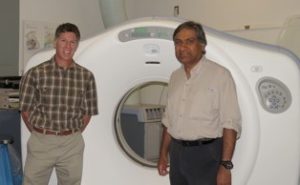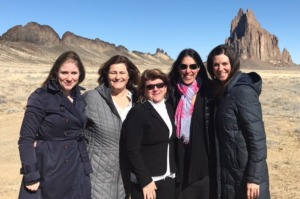Originally published in BWH Bulletin 11/30/17
For several BWHers, including Srini Mukundan, MD, PhD, of the Department of Radiology, being able to work with care providers at Northern Navajo Medical Center in Shiprock, N.M., and Gallup Indian Medical Center in Gallup, N.M., through the Brigham and Women’s Outreach Program with Indian Health Service (IHS) has been an educational and transformative experience they will always cherish.
Mukundan, who has trained IHS staff on-site in Shiprock and remotely from BWH, said his experiences with the program provide an antidote to burnout and remind him why he chose this path in medicine.

“The Outreach Program opportunities have been one of the greatest rewards of being a BWHer,” Mukundan said. “After meeting the wonderful patients and witnessing firsthand the work of our remarkable colleagues at Shiprock, it is clear how important the essence of the physician-patient relationship is, especially in light of the limited resources available in Shiprock.”
Since 2009, BWHers have collaborated with the Navajo Area IHS – the federal agency responsible for delivering medical and public health services to members of federally recognized Native American tribes in the region. Through the Brigham and Women’s Outreach Program with IHS, BWH faculty, nurses, trainees and other providers volunteer their time and expertise to provide specialized care and training – on the ground at IHS hospitals and through remote teaching – in rural New Mexico and Arizona.
Advancing Care
Over the past year, BWHers across multiple disciplines have helped establish critically needed and sustainable services that would have otherwise been unavailable in these resource-poor areas.
Earlier this year, a BWH team traveled to Shiprock to teach IHS staff about human-trafficking in addition to screening and intervention strategies for domestic violence in the health care setting. Because of that visit, a BWH/IHS Trauma-Informed Care working group has been established with the goal to implement a trauma-informed care model in Shiprock by late 2018.
“During our time there, I learned new things from my Brigham colleagues as well as from the IHS staff. The whole experience challenged me to think more broadly about my interactions here with patients in the Emergency Department,” said Hanni Stoklosa, MD, MPH, an attending physician in the Department of Emergency Medicine and a member of the Division of Women’s Health, who trained IHS staff in human-trafficking awareness.
Annie Lewis-O’Connor PhD, MPH, NP, director of the C.A.R.E. Clinic and a member of the Division of Women’s Health, provided staff with techniques for incorportating trauma-informed care into practice, emphasizing the need for self-care, patient autonomy and meeting patients where they are at.

Also on the team was Jacqueline Savage Borne, LICSW, hospital program manager for the Passageway program in the Center for Community Health and Health Equity, who said working with the program was a professional dream fulfilled.
“The providers at Shiprock are so deeply committed to holistic, trauma-informed care for their patients,” Savage Borne said. “The resiliency in this community and its network of care providers is nothing short of inspiring.”
The collaboration between BWH and IHS providers results in dramatic, lasting improvements in care. Because of the radiology training provided by Mukundan, a neuroradiologist and medical director of Magnetic Resonance Imaging at BWH, along with other faculty members and house officers from the Department of Surgery, Shiprock providers are now able to screen patients for stroke based on head CT scans. Prior to this, they had no ability to provide this service.
Also in the works is a live, interactive remote video-training program to license IHS clinicians to be able to administer buprenorphine, a medication to treat opioid use disorder. Joji Suzuki, MD, director of the Division of Addiction Psychiatry, provides the same training in Boston and will lead the new remote course. Such support is needed to help IHS clinicians combat the opioid crisis in their remote and resource-poor communities.
“I have a lot of respect for the clinicians in IHS. I have visited and taught remotely, and I’ve seen firsthand how they work under very difficult conditions due to their limited resources,” Suzuki said. “I’m pleased we’ll be able to help them have access to training that would have otherwise not been readily available.”
Thomas Sequist, MD, MPH, a primary care physician in the Phyllis Jen Center for Primary Care and medical director of the Outreach Program with IHS, said he believes the Outreach Program is a vital resource for the region.

“Access to specialty care services is particularly challenging in more rural parts of the country, often limiting the treatment options for patients in these areas,” said Sequist, who also serves as chief quality and safety officer at Partners HealthCare. “We are extremely proud of the work of our BWH clinical community – physicians, nurses and other staff working together to fill important gaps in care. This work is built on the premise of establishing long-lasting relationships that represent a sustainable approach to delivering advanced and high-quality care in these native communities.”
